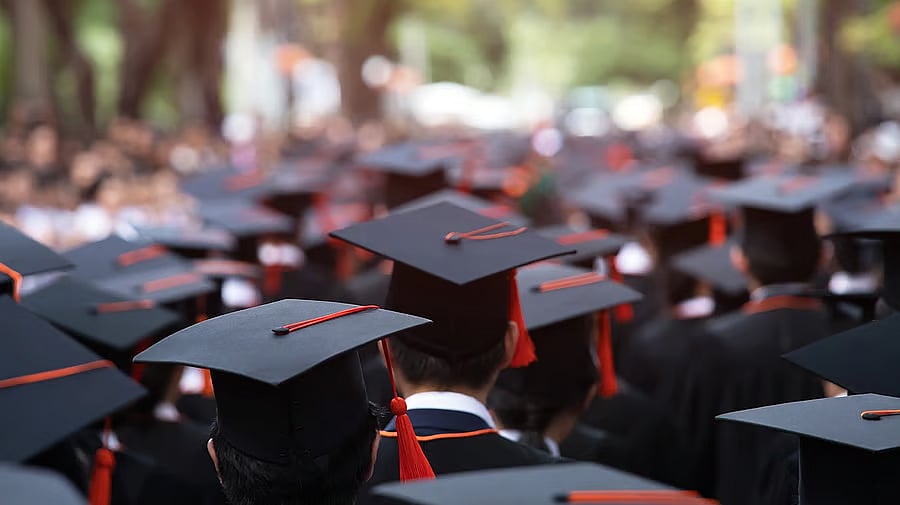
Image showing students wearing graduation caps. For representational purposes.
Credit: iStock Photo
The barring of Megha Vemuri, an Indian-origin graduate of the Massachusetts Institute of Technology (MIT), from attending her own commencement ceremony has ignited a blaze of arguments and counterarguments across campuses and continents. Vemuri, an outspoken critic of the war in Gaza, was reportedly denied the opportunity to walk at graduation due to her role in organising and delivering a speech condemning Israel’s actions in Gaza and the US complicity in it. This incident raises an urgent question: are American universities—the traditional bastions of free speech—now compromising that very principle to align with the political sensitivities of the US establishment and, by extension, Israeli interests?
At the heart of the issue is not merely a geopolitical disagreement but a fundamental clash between institutional authority and the democratic right to dissent. While American universities have long prided themselves on fostering intellectual diversity and robust debate, the treatment meted out to Vemuri signals a sinister shift. The response to student activism—particularly that which challenges US foreign policy or criticises Israel—has grown increasingly repressive. And troublingly, students of Indian origin, especially those engaged in progressive activism, appear to be disproportionately targeted.
This trend has not emerged in a vacuum. Over the past few years, pro-Palestinian activism on US campuses has surged in response to the escalating humanitarian crisis in Gaza. At the same time, the backlash has been swift and severe. Students protesting Israeli policies have been surveilled and doxxed—targeted in invasive and harmful ways simply for taking a bold, unequivocal stand.
Institutions that once celebrated anti-war protestors in the Vietnam era now find themselves in a paradox: touting free expression while cracking down on dissent that might upset corporate donors, alumni, or political patrons. Megha Vemuri’s case exemplifies this contradiction. A student leader with a record of academic excellence and civic engagement, she was denied the simple dignity of graduation for voicing a moral position that resonated with many. Her speech, by most accounts, was peaceful, pointed, and consistent with democratic norms. Yet, the university’s punitive response implies a disturbing litmus test: critique the war, criticise the US or Israel, and risk exclusion.
Is this merely a case of political overreach, or is there a racialised subtext as well? While some white American students have faced warnings or short suspensions for similar activism, the sanctions against Vemuri were stark and symbolic. The denial of a graduation walk is not just procedural—it is performative punishment. It sends a message, especially to international and brown students: your presence is conditional, and your voice—especially if it disturbs the status quo—comes at a cost.
These patterns are not isolated. Indian students and academics who speak out—on Gaza, caste, climate justice, or corporate overreach—frequently find themselves under scrutiny. Their activism is often viewed with suspicion, with subtle insinuations of foreign interference or extremism. Ironically, even as India faces global criticism for shrinking democratic space, Indian-origin youth abroad are now encountering similar intolerance in spaces once presumed to be free.
American universities find themselves at a pivotal moment. In an age when student voices are among the last remaining sources of moral clarity, institutional overreach undermines their credibility. Higher education must not devolve into a space where only corporate-sanctioned, politically agreeable opinions are tolerated. The very essence of a university lies in nurturing critical inquiry and the freedom to question — even when it unsettles.
Moreover, the suppression of pro-Palestinian advocacy under the guise of maintaining campus “harmony” or “safety” is disingenuous. True safety cannot be built on silencing those who cry out against injustice. Rather, it must arise from open engagement, mutual respect, and the willingness to confront uncomfortable truths. To deny students like Vemuri a platform is not only to violate their rights but also to impoverish the intellectual soul of the academy.
To be clear, this is not about being “pro” or “anti” any nation. It is about defending the right to question, critique, and speak—rights that are the bedrock of democracy and education alike. If America wants to retain its moral high ground as a defender of free speech globally, it must start by honouring that principle at home.
The MIT incident is a cautionary tale, not only for the US but for all democracies. As political polarisations intensify and institutions come under pressure to toe lines of power, the space for dissent shrinks. Drowning out voices like Vemuri’s would be a step in the wrong direction. Instead, universities must reclaim their role as forums for fearless dialogue—where moral courage is not punished but praised. In doing so, they may yet restore faith in the idea that education is not merely about acquiring degrees but about shaping citizens unafraid to speak truth to power.
(The writer is an independent journalist)